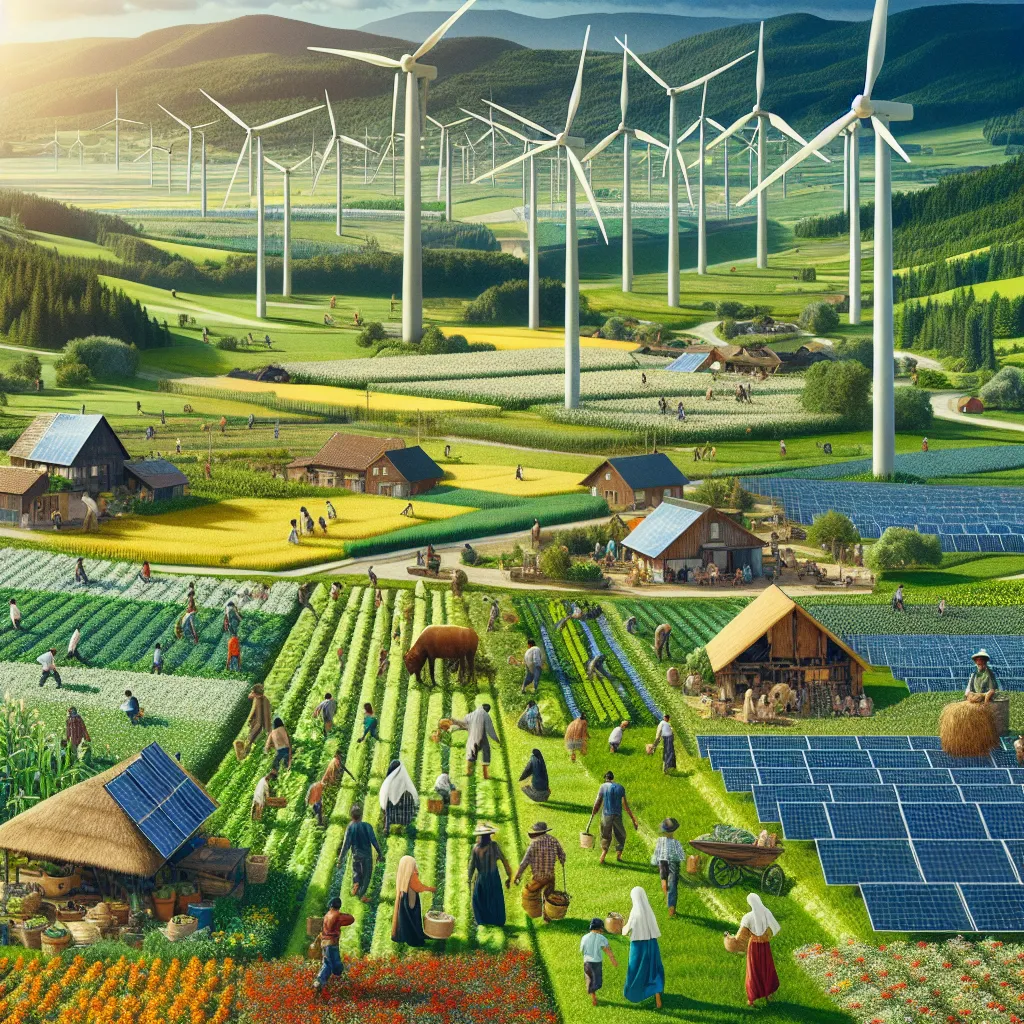The topic of renewable energy benefits for rural areas has become increasingly prevalent in IELTS Writing Task 2 exams. Based on recent trends and the growing global focus on sustainable development, we can expect this theme to appear more frequently in future tests. Let’s explore a sample question that aligns closely with actual IELTS exam topics:
Some people believe that the development of renewable energy sources in rural areas can bring significant economic and social benefits to local communities. To what extent do you agree or disagree with this statement?
Analyzing the Question
This question asks for your opinion on the potential economic and social impacts of renewable energy development in rural areas. Key points to consider:
- Focus on renewable energy sources
- Economic and social benefits
- Rural areas specifically
- Extent of agreement or disagreement
Sample Essay
Here’s a model essay that addresses the question effectively:
In recent years, the implementation of renewable energy projects in rural regions has gained traction as a potential driver of economic growth and social progress. I strongly agree that such initiatives can bring substantial benefits to local communities, revolutionizing their way of life and creating new opportunities.
Firstly, the development of renewable energy sources can significantly boost the local economy in rural areas. The construction and maintenance of solar farms, wind turbines, or hydroelectric plants create job opportunities for local residents, ranging from skilled technicians to support staff. This influx of employment not only reduces unemployment rates but also increases the overall income level of the community. Moreover, the presence of these energy projects can attract ancillary businesses and services, further stimulating economic growth in previously overlooked regions.
Secondly, renewable energy projects can lead to improved infrastructure and services in rural areas. The investment in energy production often comes hand in hand with upgrades to roads, telecommunications, and other essential services. This enhanced infrastructure not only supports the energy projects but also benefits the entire community, improving their quality of life and connectivity to the wider world. Additionally, the reliable and clean energy produced can power schools, healthcare facilities, and local businesses more effectively, contributing to better education and healthcare outcomes.
Furthermore, the adoption of renewable energy sources can foster a sense of pride and environmental stewardship within rural communities. As local residents become involved in sustainable energy production, they often develop a stronger connection to their environment and a greater awareness of ecological issues. This can lead to more sustainable practices in other areas of community life, creating a positive ripple effect that extends beyond energy production.
However, it is important to acknowledge that the implementation of renewable energy projects in rural areas is not without challenges. Initial costs can be high, and there may be concerns about land use or changes to the local landscape. Nevertheless, with careful planning and community involvement, these obstacles can be overcome, and the long-term benefits can far outweigh the initial drawbacks.
In conclusion, I firmly believe that the development of renewable energy sources in rural areas has the potential to bring about transformative economic and social benefits. By creating jobs, improving infrastructure, and fostering environmental awareness, these projects can revitalize rural communities and pave the way for a more sustainable and prosperous future.
(Word count: 377)

Key Writing Tips
When addressing this topic, consider the following:
- Structure: Ensure a clear introduction, body paragraphs (each discussing a distinct benefit), and a conclusion.
- Vocabulary: Use a range of topic-specific vocabulary related to renewable energy and rural development.
- Examples: Provide specific examples of renewable energy sources and their potential impacts.
- Balance: While agreeing with the statement, acknowledge potential challenges to demonstrate a nuanced understanding.
- Coherence: Use appropriate linking words to ensure smooth transitions between ideas.
Essential Vocabulary
- Renewable energy (noun) /rɪˈnjuːəbl ˈenədʒi/ – Energy from a source that is not depleted when used
- Sustainable (adjective) /səˈsteɪnəbl/ – Able to be maintained at a certain rate or level
- Infrastructure (noun) /ˈɪnfrəstrʌktʃə(r)/ – The basic physical and organizational structures needed for operation
- Economic growth (noun phrase) /ˌiːkəˈnɒmɪk ˈɡrəʊθ/ – An increase in the amount of goods and services produced per head of the population over a period of time
- Environmental stewardship (noun phrase) /ɪnˌvaɪrənˈmentl ˈstjuːərdʃɪp/ – The responsible use and protection of the natural environment
- Ancillary (adjective) /ænˈsɪləri/ – Providing necessary support to the primary activities or operation
- Revitalize (verb) /ˌriːˈvaɪtəlaɪz/ – To give new life or vigor to
Conclusion
The topic of renewable energy benefits for rural areas is likely to remain relevant in IELTS Writing Task 2. To prepare effectively, practice writing essays on related themes such as:
- The challenges of implementing renewable energy in developing countries
- The impact of green energy on job creation in various sectors
- The role of government in promoting sustainable energy practices
- Balancing economic development with environmental conservation in rural areas
Remember to support your arguments with specific examples and use a wide range of vocabulary and complex sentence structures to achieve a high band score.